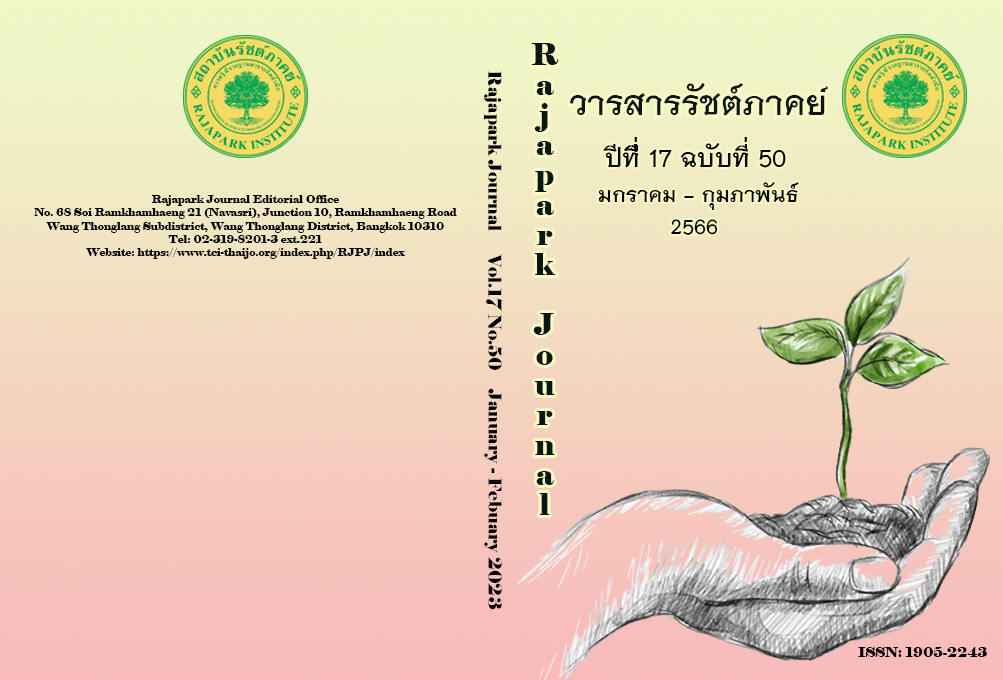อิทธิพลของการเปิดเผยข้อมูลความรับผิดชอบด้านสิ่งแวดล้อม สังคม และบรรษัทภิบาลต่อผลการดำเนินงานของบริษัทที่จดทะเบียนในตลาดหลักทรัพย์แห่งประเทศไทย
Main Article Content
บทคัดย่อ
การวิจัยครั้งนี้มีวัตถุประสงค์เพื่อศึกษาอิทธิพลของการเปิดเผยข้อมูลความรับผิดชอบด้านสิ่งแวดล้อม สังคม และบรรษัทภิบาลต่อผลการดำเนินงานขององค์กร ด้านปฏิบัติการ ด้านการเงิน และด้านตลาด ของบริษัทที่จดทะเบียนในตลาดหลักทรัพย์แห่งประเทศไทย เป็นการวิจัยเชิงปริมาณ กลุ่มตัวอย่างจำนวน 472 บริษัท วิธีการศึกษาใช้ข้อมูลทุติยภูมิเก็บรวบรวมข้อมูลจากรายงานความยั่งยืนและข้อมูลทางการเงินทางเว็บไซต์ของตลาดหลักทรัพย์แห่งประเทศไทยที่เปิดเผยต่อสาธารณะชน ช่วงปี พ.ศ. 2562 – 2564 ได้แก่ การได้รับการจัดอับดับใน ESG100 ผลการประเมินการกำกับดูแลกิจการ การประเมินคุณภาพการจัดประชุมสามัญผู้ถือหุ้น การได้รับคัดเลือกให้มีรายชื่ออยู่ใน Thailand Sustainability Investment การได้รับคัดเลือกให้มีรายชื่ออยู่ในกลุ่มดัชนีความยั่งยืนดาวโจนส์ การวิเคราะห์ข้อมูลใช้สถิติเชิงพรรณนาในการอธิบายลักษณะของกลุ่มตัวอย่าง และใช้สถิติเชิงอนุมานในการวิเคราะห์ความสัมพันธ์ของตัวแปร ด้วยการวิเคราะห์ความถดถอยเชิงพหุ ผลการศึกษาพบว่า ผลการประเมินคุณภาพการจัดประชุมสามัญผู้ถือหุ้น มีอิทธิพลต่อผลการดำเนินงานขององค์กร ด้านปฏิบัติการ ด้านการเงิน ในทิศทางเดียวกัน ส่วนผลการประเมินการกำกับดูแลกิจการ มีอิทธิพลต่อผลการดำเนินงานขององค์กรที่จดทะเบียนในตลาดหลักทรัพย์แห่งประเทศไทย ด้านตลาดในทิศทางตรงข้าม
Article Details

อนุญาตภายใต้เงื่อนไข Creative Commons Attribution-NonCommercial-NoDerivatives 4.0 International License.
ทัศนะและความคิดเห็นที่ปรากฏในวารสาร ถือเป็นความรับผิดชอบของผู้เขียนบทความนั้น และไม่ถือเป็นทัศนะและความรับผิดชอบของกองบรรณาธิการ
เอกสารอ้างอิง
Alareeni, B. A., & Hamdan, A. (2020). ESG impact on performance of US S&P 500-listed firms. Corporate Governace, 20(7), 1409-1428.
Baird, P. L., Geylani, P. C., & Roberts, J. A. (2012). Corporate Social and Financial Performance Re-Examined: Industry Effects in a Linear Mixed Model Analysis. Journal of Business Ethics, 109(3), 367–388.
Balatbat, M.C.A., Siew, R.Y.J., & Carmichael, D.G. (2012). ESG scores and its influence on firm performance: Australian evidence. School of Accounting Seminar Series Semester, 1-30.
Barnett, M.L., & Salomon, R.M. (2006). Beyond dichotomy: the curvilinear relationship between Social responsibility and financial performance. Strategic Management Journal, 27(11), 1101-1122.
Barnett, M.L., & Salomon, R.M. (2012). Does it pay to be really good? Addressing the shape of The relationship between social and financial performance. Strategic Management Journal, 33(11), 1304-1320.
Bauer, R., Eichholtz, P., & Kok, N. (2010). Corporate governance and performance: the REIT effect real estate economics. Real Estate Economics, 38(1), 1-29.
Chiong, P.T.N. (2010). Examination of Corporate Sustainability Disclosure Level and Its Impact on Financial Performance[Doctoral dissertation, University of Multimedia].
Elsayed, K., & Paton, D. (2005). The impact of environmental performance on firm performance: static and dynamic panel data evidence. Structural Change and Economic Dynamics, 16(3), 395-412.
Fisher-Vanden, K., & Thorburn, K.S. (2011). Voluntary corporate environmental initiatives and shareholder wealth. Journal of Environmental Economics and Management, 62(3), 430-445.
Fombrun, C.J., Gardberg, N.A., & Barnett, M.L. (2000). Opportunity platforms and safety nets:corporate citizenship and reputational risk. Business and Society Review, 105(1), 85-106.
Jones, T.M. (1995). Instrumental stakeholder theory: a synthesis of ethics and economics. Academy of Management Review, 20(2), 404-437.
Kim, J., Chung, S., Park, C., & Friedman, M. (2013). Corporate social responsibility and financial performance: the impact of the MSCI ESG ratings on Korean firms. Journal of the Korea AcademiaIndustrial Cooperation Society, 14(11), 5586-5593.
Kumpolkunjana, P. (2015). The Corporate Social Responsibility disclosure of SET 100 index listed companies on The Stock Exchange of Thailand[Master’s Thesis, Thammasat University].
Murray, A., Sinclair, D., Power, D., & Gray, R. (2006). Do financial markets care about social and environmental disclosure? Further evidence and exploration from the UK. Accounting, Auditing & Accountability Journal, 19(2), 228–255.
Porter, M. E., & Van der Linde, C. (1995). Toward a new conception of the environment-competitiveness relationship. J. Econ. Perspect, 9, 97–118. DOI: 10.1257/jep.9.4.97
Promlao, K. (2021, May). What is the concept of ESG and why is it so popular with investors today?. TRIS CORP. https://www.tris.co.th›esg.
San Ong, T., Teh, B.H., & Ang, Y.W. (2014). The impact of environmental improvements on the financial performance of leading companies listed in Bursa Malaysia. International Journal of Trade, Economics and Finance, 5(5), 386-391.
Sektrakul, K. (2020, February 28). ESG Investment Forum “ESG: A new dimension of professional stock analysis”. MGR online. https://mgronline.com/stockmarket/detail/9630000020280.
Smith, M., Yahya, K., & Marzuki Amiruddin, A. (2007). Environmental disclosure and Performance reporting in Malaysia. Asian Review of Accounting, 15(2), 185-199.
Sornsongkram, P. (2017). Environment, Social, Governance (ESG) and firm performance (Tobin’s Q) of listed Thai energy and Resources companies[Master’s Thesis, Thammasat University].
Sustainable Capital Market Development. (2022). Sustainability disclosure & Reporting. SET. https://www.setsustainability.com/page/disclosure.
Taneja, S.S., Taneja, P.K., & Gupta, R.K. (2011). Researches in corporate social responsibility: A review of shifting focus, paradigms, and methodologies. Journal of Business Ethics, 101(3), 343-364.
The Stock Exchange of Thailand. (2022). Thailand Sustainability Investment (THSI) List 2015-2021. SET. https://www.setsustainability.com/libraries/710/item/thailand-sustainability-investment-Lists.


